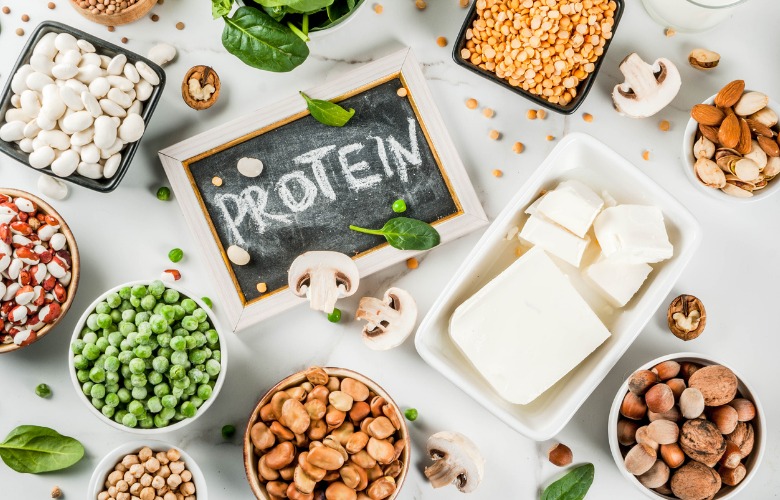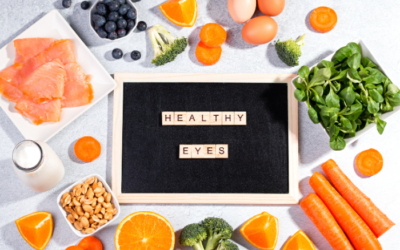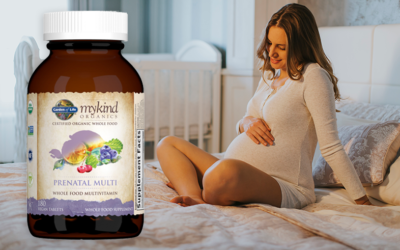Slashing Protein Myths about a Vegan Diet
The word “protein” comes from the Greek word “proteos”, meaning “of prime importance.” Today we know that although we need to consume protein, we don’t need to eat nearly as much as we do today. Neither does protein need to come from animals, we can get all we need from plants, just like some animals people eat, do! (1) This leads to the question: “Why not go directly to the source, i.e. plants – to get the nutrients we need instead of through an animal?”
Although meat, fish, eggs and milk are sources of protein the body can use, they are often less desirable compared to plant-based sources. Researchers have found that a plant-based diet is linked to living longer, weighing less, and reducing oxidative stress and inflammation in the body which also helps ward off autoimmune diseases such as rheumatoid arthritis, Alzheimer’s disease and heart disease. (2)
Animal-based sources of protein are associated with a myriad of preventable diseases. The list includes hypertension, type 2 (adult-onset) diabetes, high cholesterol, cancer, coronary artery disease, ischemic strokes, and an array of autoimmune diseases. Interestingly (and tragically), early exposure to cow milk has been implicated in increasing the risk of developing type 1 diabetes (juvenile-onset).
Most people equate protein with meat, seafood, eggs and cheese so they assume a vegan diet is bound to be insufficient. That’s probably because it is estimated that 2/3 of the protein in diets in North American and in many other western countries come from animal products, and just 32% come from plant foods. But looking at the rest of the world, plants often contribute more than half of the protein in human diets globally with grains being a large component.(3)
Dr. Colin Campbell’s book “The China Study”, the largest epidemiological study to date on human nutrition, is a wonderful resource which contains loads of compelling research showing that plant protein is in fact the healthiest type of protein.
The three biggest myths around protein and a vegan diet are as follows
Myth #1: You can’t get enough protein on a vegan diet
Vegan diets are no more likely to be protein deficient than an animal-based diet.(6) In fact it is virtually impossible to be protein deficient, unless you are starving.8 There is protein in practically every food including fruits, vegetables, legumes, nuts and seeds. It’s also worth noting that “protein” is not a food group, but a macro-nutrient. Dr. Garth Davis notes in his book that only 3% of people are deficient in protein from malnourishment, anorexia and or starvation. However, 97% of Americans are fiber deficient.(1) Shouldn’t we worry about that instead?
So how much protein do we need?
We don’t need nearly as much protein as one might think. It is recommended that adults, both male and female, consume 0.80 grams of protein per kilogram of body weight per day. This would mean that we need to consume approximately 51 grams of protein per day. An example of a typical vegan menu (divide into separate meals) which would meet this requirement: One cup of oatmeal (6 grams), 5 ounces tofu (11 grams), one cup broccoli (4 grams), one cup cooked brown rice (5 grams), 4 tablespoons almonds (7 grams), one cup chopped kale (2.9 grams), one cup cooked beans (12 grams), and one cup avocado (2.9 grams). (4)(5)
Older people and seniors may need 1 to 1.1 g/kg, as the body’s ability to use protein becomes less efficient after the age of 60. Protein needs are increased for women who are pregnant or breastfeeding. In addition, needs are also higher for very active persons. As these groups require additional calories, increased protein needs can easily be met through larger intake of food consumed daily. An extra serving of legumes, tofu, meat substitutes, or other high protein sources can help meet needs that go beyond the current RDA.(5)
The truth is that people typically eat more animal protein than they can process, and even vegetarians (who still consume milk and eggs) often consume too much as well. Excessive animal protein is incredibly toxic to our bodies. The liver’s ability to convert excess nitrogen to urea is saturated, and the blood becomes acidic. This can cause you to lose a significant amount of water (leading to dehydration), muscle mass, and bone calcium. It’s hard to eat too much plant-based protein – which is why plant-based protein is superior in many ways.
Myth #2: Some people need to eat meat
This often comes from the “bio-individuality” term that every person is different and requires different sources of food to thrive. There is no evidence that certain people “require” meat for their well-being. When born into and living in a state of health, we are very similar to one another in our nutritional needs, as are all members of a species. It is only when the body is in a state of disease that we need personalized nutrition.(6)
Some vegans are not getting enough of what they need because they are eating diets that are too restrictive and/or they are not taking appropriate supplements. A B12 supplement is necessary (I recommend this to meat eaters too) and vitamin D in the dark winter months. The reason why many people who attempt a vegan diet feel weak, sick or low in energy, is many times because they are not eating enough, or enough varieties of different foods. (6)
In her book “Meathooked”, science writer Marta Zaraska writes that humans weren’t designed to eat meat. We lack the dental make up to eat meat, and our intestines are much longer than carnivorous animals which causes issues with breaking down and digesting meat as well. (8) More than anything we are addicted to meat, rooted in our evolutionary history, chemistry and taste, politics and psychology and culture.
Myth #3: Plant based proteins does not contain all the essential amino acids and you need to combine sources of protein
It was once thought that various plant foods had to be eaten together to get their full protein value, otherwise known as protein combining or protein complementing. This has now been proven wrong. It is unnecessary to combine various plant-based sources of protein; the body combines them for you. As Registered Dietitian Virginia Messina, has written: “Myths about amino acid shortages and food combining were put to rest decades ago by experts and researchers in protein nutrition. 9 of the 20 amino acids are known as essential or indispensable amino acids because we have to get them from food. Fortunately, every one of these is present in plant foods, contrary to many myths out there that says they are not complete.
Every plant food that provides protein — which includes all grains, legumes, nuts, seeds, and vegetables — contains all of the essential amino acids that are needed by humans. Individual plant foods have lower percentages of some of the amino acids relative to needs, but it doesn’t matter for those who eat a healthy vegan diet. For one thing, the body maintains its own temporary storage of amino acids. And amino acids from different foods work together throughout the day to produce the right amounts and ratios of these protein building blocks. (9)
Now that we have squashed some myths, what are the best sources of plant-based protein?
There are numerous options for protein-dense, plant-based sources of protein. Some great ones include: tempeh, cooked soybeans, seitan, lentils, refried beans, chickpeas (and hummus), avocados, tofu, versatile grains such as quinoa and teff, peas, peanut butter, almonds, sunflower seeds, whole wheat bread, soy milk, spinach, broccoli, oatmeal, kale, and the list goes on!
Whole foods are healthiest by far, but there are options for pre-packaged, protein-rich meat and dairy alternatives, such as vegan deli slices, ‘bacon’, burgers, ‘chicken’ patties and tenders, non-dairy cheeses, butters and milks.
As long as you are consuming a variety of plant-based foods that includes a few servings of legumes (beans, peanuts or soy foods) and/or protein-rich grains every day, you’ll have no trouble meeting protein requirements without animal foods. (10)
In summary, if you eat a variety of foods from all the vegan food groups and you get enough calories, it is virtually impossible to fall short on protein.
Resources
1. Davis, Garth M.D. Proteinaholic; how our obsession with meat is killing us and what we can do about it. New York: Harper Collins. 2015. Print.
2. Palmer, Sharon R.D. The Plant Powered Diet. 2012. New York: The Experiment. Print.
3. McDougall, John A Dr., The Starch Solution. 2012. New York: Rodale Inc. Print
4. The Protein Myth. Physicians Committee for Responsible Medicine. Web. August 25, 2018.
5. A Vegan Doctor Addresses the Protein Question. Free from Harm. September 18, 2013. Web. August 29, 2018.
6. Bio-Individuality and the Myth That Some People ‘Just Need Meat’. Free from Harm. July 24, 2017. Web. August 31, 2018.
Protein for Vegans: Old Myths Die Hard. The Vegan RD. December 13, 2008. Web. August 29, 2018;
7. Do Some People Need to Eat Meat? The Vegan RD. March 2nd, 2013. Web. September 1, 2018.
8. Humans Are ‘Meathooked’ But Not Designed for Meat-Eating. National Public Radio, Inc. May 19, 2016. Web. August 31, 2018.
9. Davis, Garth M.D. Proteinaholic; how our obsession with meat is killing us and what we can do about it. New York: Harper Collins. 2015. Print.
10. A Vegan Doctor Addresses the Protein Question. Free from Harm. September 18, 2013. Web. August 29, 2018.

Sunny is a vegan lifestyle consultant, chef, wine educator and food blogger. She works with both private and corporate clients, helping people transition to a plant-based diet and vegan way of life, as well as operating as a consultant for restaurants and other food establishments who are looking to veganize their food menus and wine lists. Sunny is the wine director for Vegan Wines, the first vegan online wine club in the United States, and is passionate about animal advocacy. She lives in Beacon, NY with her husband and three dogs: Scooby, Tofu and Nacho. You can contact sunny by email sunny@sunnygandara.com.



